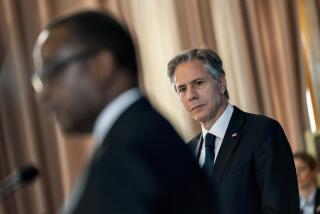Financial Pressure Key in Congo Pact, U.S. Aide Says
- Share via
NAIROBI, Kenya — American U.N. Ambassador Bill Richardson said Monday that it was the threat of a loss of foreign investment that finally persuaded Congo’s president, Laurent Kabila, to agree to a United Nations investigation of alleged atrocities by his army.
The agreement, reached over the weekend in Kinshasa, the Congolese capital, will allow a U.N. team to investigate whether the then-rebel army massacred Rwandan refugees. And Richardson, speaking with journalists in Nairobi, the Kenyan capital, said the pact came after four hours of roller-coaster negotiations.
Eventually, Kabila “became convinced that if he didn’t take this step, it would be difficult for him to get support for developing his country,” Richardson said. Kabila was also concerned that refusal to cooperate with the probe could trigger U.S. sanctions and a cut in international aid and debt relief.
If Kabila follows through on his promise, analysts said, it would be a positive indication that he realizes he needs international approval to accomplish his domestic plans.
But Richardson was cautious. While this is the strongest signal yet that U.N. experts will be able to begin a field investigation, it comes four months after such a probe was supposed to have begun.
“We’ve had commitments before, and then somehow we don’t have them,” he said.
Since July, when the U.N. investigators began looking into reports that Kabila’s rebels slaughtered thousands of Rwandan Hutus while battling the regime of the late Zairian dictator Mobutu Sese Seko, the team had been stymied by government restrictions on where it could work and for how long.
*
Kabila has denied that his forces, the majority of whom were believed to be Rwandan Tutsis, targeted refugees. But he has acknowledged that some civilians might have been caught in the cross-fire.
The new accord allows the 24-member U.N. team to travel wherever it wants in Congo, formerly Zaire. It is now scheduled to resume work in early November.
A key to the successful negotiations over the weekend seemed to be the personal relationship that Richardson and Kabila had built during three previous meetings.
“I basically told him: ‘I’ve taken the heat over you; I’ve been criticized for backing you up. What have you done for me?’ ” said Richardson, who appeared jovial and upbeat.
*
Richardson said he told Kabila that the president’s actions were being closely watched by, among others, the European Union, which has $500 million in loans ready to award the country if Kabila cooperates with the probe.
Other international donors also have said that in order to continue investing in Congo, they want to see concrete plans for revising the nation’s economy and proof that it is committed to democracy and respect for human rights.
Among other things, Kabila has banned political party activity and cracked down on street protests.
Richardson, however, said the Congolese government had recently set up a team to draft a new constitution and had announced a conference on reconstruction and reconciliation with aid agencies. And he described Kabila as “self-assured and decisive.”
“They are slowly making progress,” Richardson said. “But it is not a perfect [human rights] record. . . . Their problems are massive.”
More to Read
Sign up for Essential California
The most important California stories and recommendations in your inbox every morning.
You may occasionally receive promotional content from the Los Angeles Times.














